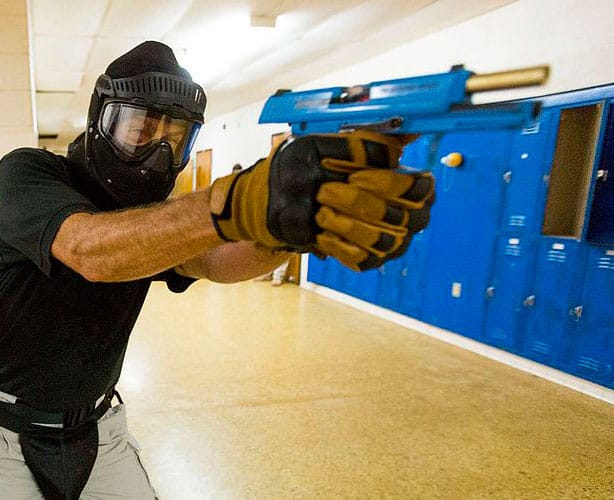Helping patients deal with school shooter anxiety
- September 18, 2019
- The REACH Institute
- Anxiety, Child mental health Cognitive behavioral therapy,

According to the National Center for Education Statistics, 92% of public schools had formal active shooter plans in 2016, and 96% conducted lockdown drills. These measures are intended to keep children safe, but they may do as much harm as good. The title of a September 4 New York Times article sums it up: “When Active Shooter Drills Scare the Children They Hope to Protect.”
We asked REACH faculty member Jasmine Reese, MD, MPH, about how students react to active shooter drills and what pediatric primary care providers (PCPs) can do. Dr. Reese is Director of the Adolescent and Young Adult Specialty Clinic at Johns Hopkins All Children’s Hospital in St. Petersburg, Florida.
“We have yet to see data on whether these drills are causing more anxiety and other mental health issues among students,” said Dr. Reese. “But it seems clear in practice that they can either cause anxiety and depression or exacerbate existing issues.”
Dr. Reese pointed out that adolescents are already susceptible to mental health issues, citing statistics from the 2017 Youth Risk Behavior Surveillance Survey from the federal Centers for Disease Control and Prevention:
- 5% of high school students showed signs of depression.
- 2% had seriously considered suicide; 13.6% had a plan.
“Here in Florida, our rates are higher than national rates — and this was before Parkland,” said Dr. Reese, referring to the 2018 high school shooting in which 17 students were killed. “I think you’re going to see those numbers increasing.”
What can a pediatric PCP do? Dr. Reese had some suggestions.
Use and share your REACH training
Diagnosis and management of mental health conditions becomes all the more important when patients feel unsafe. Use what you learned in the Patient-Centered Mental Health in Pediatric Primary Care program and share your knowledge with colleagues.
Collaborate with schools
If possible, work with high schools to engage counselors — particularly ones with mental health training. After getting appropriate consent, give counselors a list of students you’re concerned about. “Then you’ve got eyes on those kids every day,” said Dr. Reese. Contact with schools can be handled by your practice’s mental health specialist, if there is one, or by a support person.
Engage the community
After the Parkland shooting, Dr. Reese’s hospital hosted an evening session for community members in which Dr. Reese and pediatric psychologists shared how to foster open discussion and look for warning signs of anxiety or depression. Such forums can reach many parents at a time with information that can save their children’s lives.
Lisa Hunter Romanelli, PhD, CEO of The REACH Institute and a licensed clinical psychologist, offered suggestions for using cognitive behavioral therapy techniques with patients and families
Talk about actual risks
PCPs can counteract the fear instilled by active shooter drills by pointing out that school shootings are in fact quite rare. How many U.S. students do you think have been killed by a shooter in school since Columbine? Only 200, according to the Washington Post.
Suggest minimizing media exposure
Media coverage makes school shootings seem much more common than they are. Suggest to parents of younger children that they turn off screens after a school shooting in favor of other activities the child enjoys. Work with teens to help them set their own limits for media exposure — for example, five minutes per hour and not for an hour before bedtime. Think with them about ways to self-enforce their rules in the wake of a crisis.
Teach coping techniques
To counter anxiety during a school shooting drill, patients can learn calming techniques. Teach them deep breathing to calm their bodies. Coach them to use self-talk to calm their minds — things like “This is just practice. It’s not real. I’m safe.” Make sure the caregivers are listening too! They not only can remind their kids but also use these techniques themselves.
RESOURCES
For parents
This WebMD article points out that “Knowledge is a parent’s greatest ally in helping a child deal with fears about school shootings and lockdown drills.”
The American School Counselor Association offers resources for parents and teachers on Helping Kids after a Shooting.
For school personnel
You may want to share with district and school leaders the document Best Practice Considerations for Schools in Active Shooter and Other Armed Assailant Drills from the National Association of School Psychologists.
The advice for teachers offered by the publishing company Scholastic on helping kids deal with active shooter drills is broken down by age range.
Categories
- ADHD
- Anti-racism
- Anxiety
- Assessment & screening
- Autism
- Child mental health
- Coding
- Cognitive behavioral therapy
- College transition
- Culturally responsive
- Depression
- Eating disorders
- Foster care
- Grief
- High-risk children & youth
- LGBTQIA
- Medication
- Parents
- Patient communication
- Pediatric primary care
- School refusal
- Sleep disorders
- Suicide
- Trauma
- Show All Categories
Register for courses
“This course has made me more comfortable in dealing with my patients with mental illness As the PCP, I would normally refer to psychiatry or psychology, but I would now feel more capable to handle the more straightforward cases.”
